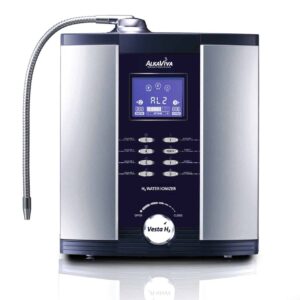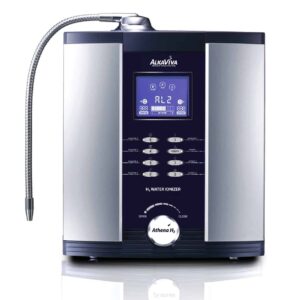When it comes to training and fitness we are all different, but we all want the same thing. This is true whether you are 20 or 80 years old, or you do aerobics, yoga, Pilates, running, weight training or cross-fit, whether you do pleasure sports or participate in competitions, or you train once a week or you are a professional.
Regardless of the approach of each of us, we all want an easy, simple and natural method to enjoy more and benefit more from the time and effort we invest in our physical activities. What if there was a convenient and natural way for you to have more energy and reduce fatigue, lactic acid buildup and oxidative stress? A method to recover faster, increase your performance and be able to enjoy more physical activity?
There is a growing number of credible scientific evidence showing that molecular hydrogen (H2) offers all of the above benefits, and even more. The best way to bring a supply of molecular hydrogen into the body is to drink water with dissolved molecular hydrogen (H2). H2 caught the attention of scientists about 10 years ago. Since then, more than 500 studies have been published showing that hydrogen has therapeutic benefits in 150 models of diseases and health problems that affect all organs. An increasing number of these studies have shown that molecular hydrogen (H2) offers significant benefits for athletic performance and routine training.
What makes sports, physical activity and training difficult?
Whether you walk to keep fit, or you train for the Olympics, the answer is the same. Logically, any activity or training more intense than the state of rest immediately increases the body’s need for energy and oxygen to be able to support that activity. Any activity that is more intense than the level of activity your body is used to induces stress in the body and causes a cascade of effects.
Elevated oxygen levels produce a greater amount of harmful free radicals, which cause oxidative stress. Oxidative stress attacks your cells without you realizing it, which leads to loss of cell vitality and death, causing muscle breakdown, weakness, fatigue, and inflammation. (1-3) This is especially true for training-induced oxidative stress. physical.
If your activity is intense enough, you will use the available energy in the form of ATP (adenosine triphosphate) and your body will burn glycogen. When this happens you will feel muscle burns caused by the accumulation of lactic acid, which leads to fatigue and probably muscle fever. All this decreases your endurance, reduces your performance, decreases your results and reduces your pleasure of doing sports.

Molecular hydrogen (H2) increases your energy level
ATP (Adenosine Triphosphate) is the fuel used in cells for all body activities. The food we eat and the oxygen we breathe create ATP in the mitochondria, providing energy to each cell and thus to all our activities. However, the body produces free radicals every moment of the oxygen we breathe. It is simply a given of aerobic metabolism.
Free radicals, especially oxygen-containing radicals, damage mitochondria. When the affected mitochondria cannot produce the required amount of ATP, the body begins to consume stored glycogen. Glycogen stores are found mainly in the liver, but also in muscle, and are used to store energy.
A growing body of research shows that hydrogen-infused water improves mitochondrial function, increases the amount of ATP produced, and is likely to induce mitochondrial biogenesis. (4)
H2 is the smallest molecule in the universe and therefore passes quickly through cell membranes and neutralizes harmful free radicals. Its protective properties allow mitochondria to produce optimal levels of ATP, giving you more energy.
When you have to work hard and switch from ATP to glycogen, as we sometimes do during training, research shows that H2 can help increase the amount of glycogen stored in the liver. (4)
Research has spoken. Drinking water with molecular hydrogen (H2) increases energy levels by increasing ATP production, while higher glycogen stores help reduce fatigue and muscle degradation. Use hydrogen to move on and be stronger.

H2 reduces the accumulation of lactic acid
Every time your body starts burning stored glycogen, lactic acid begins to be produced.
The accumulation of lactic acid leads to increased fatigue, muscle fever and slower recovery. Training-induced metabolic acidosis is common in some very active people and many high-performance athletes. It is another silent effect that occurs without you being aware. If you have acidosis you don’t know, only you notice and feel that you are no longer capable of the same performance.
A recent study showed that water rich in molecular hydrogen (H2) can influence athletic performance in high-performance athletes. Both muscle fatigue and lactic acid levels in the blood decreased in the control group of high-performance athletes when they consumed hydrogen-rich water before starting intense workouts controlled by strict testing protocols. (5)
A similar study found that water infused with H2 had a beneficial effect on the maximum levels of perceived effort and the accumulation of lactic acid at maximum running speeds during intense training. Although the exact mechanism of operation has not been identified, the study concludes “… hydrogen-rich water decreases the level of physical stress during very intense workouts …”. (6)
A quote from one of the many researches published on this subject says succinctly:
“Proper hydration with hydrogen-rich water before training has lowered the level of lactic acid in the blood and reduced the effect of effort-induced degradation of muscle function.”
Kosuke Aoki, et al Medical Gas Research, 2012
Molecular hydrogen (H2) protects you against oxidative stress
Any increase in your activity level above the level you are used to leads to an increased level of oxidative stress. Intense or unusual physical activity in a short period of time (eg sports competitions, interval training, weekend warriors) causes increased levels of oxidative stress and the accumulation of lactic acid (stress-induced metabolic acidosis). This leads to symptoms of overtraining such as increased fatigue, muscle fever, muscle fiber microruptures, and inflammation. Oxidative stress in any form, and whatever you get to it, is not good.
Scientists have long discovered that molecular hydrogen (H2) rapidly neutralizes free radicals, specifically the hydroxyl radical (* OH–) and the positive oxygen ion (0 +). (7-9) Of particular importance is the fact that H2 it appears to selectively target the hydroxyl radical that is most harmful to cells. Other free radicals (eg the free radical nitric oxide NO) are in fact important for the physiology and homeostasis of the cell. (7,8) Unlike other “non-selective” antioxidants, molecular hydrogen (H2) does not neutralize useful free radicals, which makes it an unparalleled antioxidant.
Molecular hydrogen (H2) decreases recovery time and accelerates healing
Recovery after exercise or training has many aspects and includes more than muscle recovery. Recovery (as athletes call it) involves chemical and hormonal balance, restoring the nervous system, mood, and more. Sometimes there is a stretching of the muscles or ligaments. A proper recovery must cover many aspects.
Research has found that H2 is beneficial in treating injuries and conditions related to oxidative stress and inflammation, and in treating soft tissue injuries that occur during sports. (10). Hydrogen has been shown to help maintain the homeostasis of enzymes including glutathione, superoxide dismutase, catalase and others. (4). Hydrogen has demonstrated the ability to improve cellular signaling (the processes of communication within cells), a critical process for brain function and neurological functions. (4.13). These properties make hydrogen water much more than a simple drink used only to rebuild muscles.

H2 improves your hydration
When molecular hydrogen neutralizes the hydroxyl radical and oxygen radicals, the only thing left in the cell after this reaction is water, which led the researchers to conclude that H2 improves cell hydration as well. This explains why no published study found any negative effects of dissolved hydrogen water consumption.
Solution H2
Hydrogen is safe and 100% natural. Research shows that molecular hydrogen is beneficial in so many of the problems that prevent us from enjoying sports more, getting better sports results, and having better fitness.
Hydrogen is also effective in a wide range of conditions caused by oxidative stress, not just those caused by intense physical activity or sports. In fact, most research on molecular hydrogen is focused on its effect in chronic diseases caused by oxidation.
Studies show that water with dissolved H2 has a positive impact in diseases related to the oxidative process, such as metabolic syndrome, diabetes, and even the side effects of anticancer treatments. (11,12) Moreover, hydrogen water is easy to obtain and affordable.
Where can I get molecular hydrogen (H2)?
Dissolved hydrogen (H2) water is produced by
- Water ionizers or hydrogen generators connected to the water network,
- Various forms of magnesium included in special water filters, such as non-electric water ionizers
- Different forms of magnesium placed in water to create H2 by chemical reaction (metallic magnesium or magnesium fumarate in the form of tablets, powders or sticks).
The first two methods above can be found in the Wellnessist store.
For a list of scientific studies on molecular hydrogen we will soon publish a special page dedicated. Until then, you can find them here.
References:
1. Djordjevic D, Cubrilo D, Macura M, Barudzic N, Djuric D, Jakovljevic V. The influence of training status on oxidative stress in young male handball players. Mol Cell Biochem. 2011; 351 (1–2): 251–259.
2. Tanskanen M, Atalay M, Uusitalo A. Altered oxidative stress in overtrained athletes. J Sports Sci.2010; 28 (3): 309–317. doi: 10.1080 / 02640410903473844.
3. Jackson MJ. Muscle damage during exercise: possible role of free radicals and protective effect of vitamin E. Proc Nutr Soc. 1987; 46 (1): 77–80. doi: 10.1079 / PNS19870010.
4. T. Lebarron The Actions of Molecular Hydrogen in the Body, MHI, March 4, 2013
5. Pilot study: Effects of drinking hydrogen-rich water on muscle fatigue caused by acute exercise in elite athletes. Med Gas Res. 2012 Jul 12; 2:12. doi: 10.1186 / 2045-9912-2-12.
6. Ostojic SM, Stojanovic MD. Hydrogen-rich water affected blood alkalinity in physically active men. Res Sports Med 2014; 22: 49–60
7. Ohsawa I, Ishikawa M, Takahashi K, Watanabe M, Nishimaki K, Yamagata K, Katsura K, Katayama Y, Asoh S, Ohta S. Hydrogen acts as a therapeutic antioxidant by selectively reducing cytotoxic oxygen radicals. Nat Med. 2007; 13 (6): 688–694. doi: 10.1038 / nm1577.
8. Kosuke Aoki, Atsunori Nakao, Takako Adachi, Yasushi Matsui, and Shumpei Miyakawa Hong Y, Chen S, Zhang JM. Hydrogen as a selective antioxidant: a review of clinical and experimental studies. J Int Med Res 2010; 38: 1893–1903
9. Hong Y, Chen S, Zhang JM. Hydrogen as a selective antioxidant: a review of clinical and experimental studies. J Int Med Res 2010; 38: 1893–1903
10. Ostojic SM, Stojanovic MD, Hoffman JR. Effectiveness of molecular hydrogen in the management of musculotendinous injuries. Med Sci Sport Exerc 2014; 46: S156 – S157
11. Huang CS, Kawamura T, Toyoda Y, Nakao A. Recent advances in hydrogen research as a therapeutic medical gas. Free Radical Res 2010; 44 (9): 971–982
12. Ohta S, Nakao A, Ohno K. The 2011 Medical Molecular Hydrogen Symposium: An inaugural symposium of the journal Medical Gas Research. Med Gas Res 2011; 1 (1): 10.
13. Kenji Dohi, Brian C. Kraemer, Michelle A. Erickson, Pamela J. McMillan, Andrej Kovac, Zuzana Flach Bartova, Kim M. Hansen, Gul N. Shah, Nader Sheibani, Therese Salameh, and William A. Banks. Molecular Hydrogen in Drinking Water Protects against Neurodegenerative Changes Induced by Traumatic Brain Injury, Injury PLoS One. 2014 Sep 24; 9 (9): e108034.
Sources:
http://alkavivanews.com/up-your-game-with-h2/







